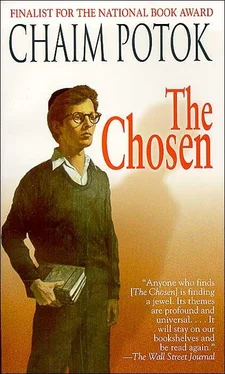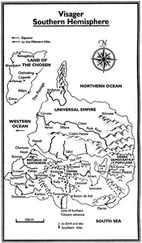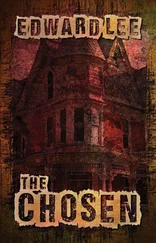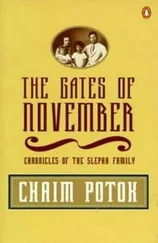Reb Saunders stood up, poured water over his hands from the pitcher, the water spilling into the saucer, then wiped his hands, removed the white satin cloth that covered the chalah, said the blessing over bread, cut a section off the end of the chalah, swallowed it, and sat down. Danny got to his feet, washed his hands, cut two slices from the chalah, handed me one, took one for himself, made the blessing, ate, and sat. He passed the pitcher to me, and I repeated the ritual, but I remained seated. Then Danny cut the remainder of the chalah into small pieces, gave a piece to his brother, and handed the plate' to the old man sitting next to me. The pieces of chalah disappeared swiftly, grabbed up by the men at the table. Reb Saunders put some salad and fish on his plate and ate a small piece of the fish, holding it in his fingers. A man from one of the other tables came over and took the plate. Danny filled another plate for his father. Reb Saunders ate slowly, and in silence.
I was not very hungry, but I made some attempt at eating so as not to insult anyone. Frequently during the meal, I felt rather than saw Reb Saunders' eyes on my face. Danny was quiet. His little brother pecked at the food on his plate, eating little. The skin of his face and hands was almost as white as the tablecloth, drawn tightly over the bones, and the veins showed like blue branches in his face and on the tops of his hands. He sat quietly, and once he began to pick his nose, saw his father look at him, and stopped, his lower lip trembling a little. He bent over his plate and poked at a slice of tomato with a thin, stubby finger.
Danny and I said nothing to each other throughout that entire meal. Once I looked up and saw his father staring at me, his eyes black beneath the thick brows. I looked away, feeling as though my skin had been peeled away and my insides photographed.
Someone began to sing Atah Echad, one of the prayers from the Evening Service. The meal was over, and the men began to sway slowly, in unison with the melody. The singing filled the synagogue, and Reb Saunders sat back in his leather seat and sang too, and then Danny was singing. I knew the melody and I joined in, hesitantly at first, then strongly, swaying back and forth. At the end of the song, another melody was begun, a light, fast, wordless tune, sung to the syllables cheeree bim, cheeree bam, and the swaying was a little faster now, and hands were clapped in time to the rhythm. Then tune followed tune, and I felt myself begin to relax. I continued to join the singing. I found that most of the melodies were familiar to me, especially the slow, somber ones that were meant to convey the sadness of the singers over the conclusion of the Shabbat, and the tunes I did not know I was able to follow easily, because the basic melody lines were almost all the same. After a while I was singing loudly, swaying back and forth and clapping my hands, and once I saw Reb Saunders looking at me, and his lips curved into a shadow of a smile. I smiled at Danny and he smiled back at me, and we sat there for about half an hour, singing, swaying, and clapping, and I felt light and happy and completely at ease. So far as I could see, Reb Saunders' little son was the only one in the synagogue not singing; he sat pecking at his food and poking at the slice of tomato on his paper plate with his thin, veined hand. The singing went on and on – and then it stopped. I glanced around to see what had happened, but everyone was sitting very still, looking over at our table. Reb Saunders washed his hands again, and others spilled what was. left of the water in their paper cups over their hands. The introductory psalm to the Grace was sung together, and then Reb Saunders began the Grace. He chanted with his eyes closed, swaying slightly in his leather chair. After the opening lines of the Grace, each man prayed quietly, and I saw Danny lean forward, put his elbows on the table, cover his eyes with his right hand, his lips whispering the words. Then the Grace was done, and there was silence – a long, solid silence in which no one moved and everyone waited and eyes stared at Reb Saunders, who was sitting in his chair with his eyes closed, swaying slightly back and forth. I saw Danny take his elbows from the table and sit up straight. He stared down at his paper plate, his face expressionless, and I almost had the feeling that he had gone rigid, tense, as a soldier does before he jumps from shelter into open combat.
Everyone waited, and no one moved, no one coughed, no one even took a deep breath. The silence became unreal and seemed suddenly filled with a noise of its own, the noise of a too long silence. Even the child was staring now at his father, his eyes like black stones against the naked whiteness of his veined face.
And then Reb Saunders began to speak.
He swayed back and forth in the leather chair, his eyes dosed, his left hand in the crook of his right elbow, the fingers of his right hand stroking his black beard, and I could see everyone at the tables lean forward, eyes staring, mouths slightly open, some of the older men cupping their hands behind their ears to catch his words. He began in a low voice, the words coming out slowly in a singsong kind of chant.
'The great and holy Rabban Gamaliel,' he said, 'taught us the following: "Do His will as if it were thy will, that He may do thy will as if it were His will. Nullify thy will before His will that He may nullify the will of others before thy will." What does this mean? It means that if we do as the Master of the Universe wishes, then He will do as we wish. A question immediately presents itself. What does it mean to say that the Master of the Universe will do what we wish? He is after all the Master of the Universe, the Creator of heaven and earth, the King of kings. And what are we? Do we not say every day, "Are not all the mighty as naught before Thee, the men of renown as though they had not been, the wise as if without knowledge, and the men of understanding· as if without discernment"? What are we that the Master of the Universe should do our will?'
Reb Saunders paused, and I saw two of the old men who were sitting at our table look at each other and nod. He swayed back and forth in his leather chair, his fingers stroking his beard, and continued to speak in a quiet, singsong voice.
'All men come into the world in the same way. We are born in pain, for it is written, "In pain shall ye bring forth children." We are born naked and without strength. Like dust are we born. Like dust can the child be blown about, like dust is his life, like dust is his strength. And like dust do many remain all their lives, until they are put away in dust, in a place of worms and maggots. Will the Master of the Universe obey the will of a man whose life is dust? What is the great and holy Rabban Gamaliel teaching us?' His voice was beginning to rise now. 'What is he telling us? What does it mean to say the Master of the Universe will do our will? The will of men who remain dust? Impossible! The will of what men, then? We must say, the will of men who do not remain dust. But how can we raise ourselves above dust? Listen, listen to me, for this is a mighty thing the rabbis teach us.'
He paused again, and I saw Danny glance at him, then stare down again at his paper plate.
'Rabbi Halafta son of Dosa teaches us, "When ten people sit together and occupy themselves with the Torah, the Presence of God abides among them, as it is said, 'God standeth in the congregation of the godly.' And whence can it be shown that the same applies to five? Because it is said, 'He had founded his band upon the earth.' And whence can it be shown that the same applies to three? Because it is said, 'He judgeth among the judges.' And whence can it be shown that the same applies to two? Because it is said, 'Then they that feared the Lord spake one with the other, and the Lord gave heed and heard.' And whence can it be shown that the same applies even to one? Because it is said, 'In every place where I cause my name to be remembered I will come unto thee and I will bless thee.' " Listen, listen to this great teaching. A congregation is ten. It is nothing new that the holy Presence resides among ten. A band is five. It is also nothing new that the holy Presence resides among five. Judges are three. If the holy Presence did not reside among judges there would be no justice in the world. So this, too, is not new. That the Presence can reside even among two is also not impossible to understand. But that the Presence can reside in one! In one! Even in one! That already is a mighty thing. Even in one! If one man studies Torah, the Presence is with him. If one man studies Torah, the Master of the Universe is already in the world. A mighty thing! And to bring the Master of the World into the world is also to raise oneself up from the dust. Torah raises us from the dust! Torah gives us strength! Torah clothes us! Torah brings the Presence!'
Читать дальше












